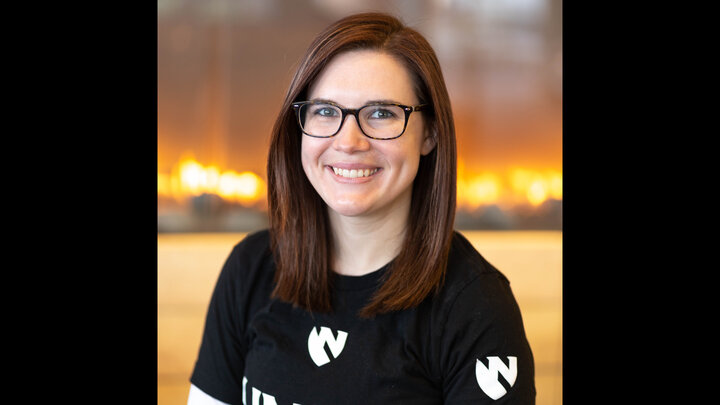Abby Crimmins earned her master's degree in speech-language pathology from the University of Nebraska-Lincoln in 2019. She currently serves as a speech-language pathologist in the inpatient units and outpatient Head & Neck Surgery Clinic and Department of Speech-Language Pathology Clinical Training Coordinator at the University of Nebraska Medical Center Munroe-Meyer Institute in Omaha. In this Q&A she shares about her experience in Nebraska's speech-language pathology master's program.
Why did you choose Nebraska for your master’s degree?
UNL’s SLP master’s program was not only a top-rated program in the country, but also felt like home. East Campus had a calm and relaxing vibe that was different than most large institutions – PLUS, the Barkley Center was only a 5-minute walk from the Dairy Store.
What set Nebraska's speech-language pathology program apart for you?
When you are applying for graduate programs, they all start to blend together. The curriculums and expectations are similar, and you leave at the end of it with a master’s degree. What made UNL’s program stand out to me was the feeling that I got when I visited during a prospective graduate student open house. I met the academic faculty, clinical supervisors, and other staff members who were so welcoming and inspiring. To hear their stories and to see the passion they have for the field and their students’ learning solidified my choice. There are a lot of graduate programs out there to choose from, but this felt like where I was meant to be.
If you had a favorite course, what was it and why?
The class that sticks out among the rest was the very first class I took on Monday nights in my first semester – Augmentative and Alternative Communication. Shout out to Dr. Kristy Weissling for sharing her passion and expertise when teaching this important subject. This class challenged me to think outside the box when it came to all communication challenges. The content did not solely focus on what the impairment is but more strongly emphasized what we as SLPs can do to support communication at its core in all environments, for all people, both now AND in the future.
What aspects of Nebraska's program helped prepare you for your current role?
The mentorship I received from the faculty and clinical supervisors was the greatest asset in my preparation not only to be a good clinician, but also a teacher, supervisor, and leader. They supported me during challenging times, pushed me when I needed it, engaged with me when I asked (many) questions, and encouraged me to be the best clinician and person that I could be.
What is your favorite part of being a speech-language pathologist?
As a primarily inpatient SLP, I work with individuals who are recovering from very serious illnesses, diseases, and surgeries. It can be an extremely overwhelming experience for patients and their families. What I love the best about my job is helping them see what life beyond the hospital will be like. The most rewarding moments are seeing the sense of pride they feel for their hard work and accomplishments, such as when a patient with a new tracheostomy tube, electrolarynx, or speech-generating device is able to say “I love you” to their friends and family for the first time in days (or weeks, or months) or a patient achieve their goal of eating cake on their birthday after they’ve worked so hard in therapy to improve their swallowing abilities again.
What advice do you have for a student considering communication sciences and disorders as a major?
I strongly recommend reaching out to observe SLPs across all settings, including those who work with adults and children even if you think you know what setting and population you’d like to work with. If you would have told me when I was an undergraduate student that I would be working with adults in a high acuity academic hospital, I would have laughed out loud. I wanted to work with kids and thought I was pretty good at that. Then I started my medical externship at UNMC and realized that working with adults, particularly in the acute care setting, was what I was truly passionate about. Now, I look back at all the work I’ve done in this field and couldn’t imagine doing anything different.
What does it mean to you to be a Husker alum?
I’m proud to be a part of an institution that has a fierce level of loyalty at its core. My days at UNL were the best part of my educational experience and I hope the current and future students feel the same.
College of Education and Human Sciences
Special Education and Communication Disorders
AlumniNews




